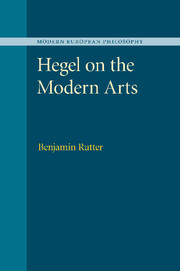Summary
And so [the painter] goes hurrying, searching. But searching for what? Be very sure that this man, such as I have depicted him – this solitary, gifted with an active imagination, ceaselessly journeying across the great human desert – has an aim loftier than that of a mere flâneur, an aim more general, something other than the fugitive pleasure of circumstance. He is looking for that quality which you must allow me to call “modernity”; for I know of no better word to express the idea that I have in mind. He makes it his business to extract from fashion whatever element it may contain of poetry within history, to distil the eternal from the transitory.
(Baudelaire, The Painter of Modern Life)The painting of the Dutch seventeenth century, now considered its golden age, was not well liked in Hegel's day. Though elements of the Romantic avant-garde did favor northern European painters, they were principally attracted, in anticipation of later primitivisms, by the crude piety of the early medieval period. For mainstream audiences, meanwhile, Winckelmann's neoclassicism and the (French) Academic hierarchy to which it was allied continued to hold sway. Schelling, who found the painters of the Netherlands “uncouth,” typifies this stance. One might have expected Hegel, an admirer of Winckelmann and a former colleague of Schelling's, to follow the contemporary high road past the lowlands, and it is telling that he did not.
- Type
- Chapter
- Information
- Hegel on the Modern Arts , pp. 63 - 119Publisher: Cambridge University PressPrint publication year: 2010



